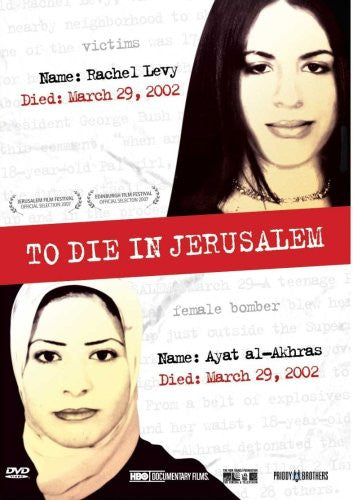-
To Die In Jerusalem (2009)
Passion River
-
$30.00
-
is back-ordered. We will ship it separately in 10 to 15 days.
-
-
Description
Some politically minded documentaries work hard to elicit a reaction from their audiences. Without even trying, the beautifully structured and emotionally devastating "To Die in Jerusalem" is strong medicine about the toll on human life and family ties exacted from suicide bombings in the Middle East. Without ever manipulating or appearing to sermonize, the documentary, directed Hilla Medalia, makes the viewer wonder when and if the nightmare will ever end. It takes a simple story, and Medalia has it down. One day in 2002, a 17-year-old Israeli student, Rachel Levy, walked into a Jerusalem supermarket -- the exact same moment 18-year-old Palestinian suicide bomber Ayat al-Akhras blew herself up in the market. Both girls died, and it wasn't until several years later that their mothers finally met. "Jerusalem" is that simple in structure: the meeting of two mothers whose grief represents two grieving populations. The docu resounds with emotion and lessons learned, lessons that go unheeded, emotions that ignite time and again. Medalia catches the two mothers and their families in close-up shots that have much larger implications. It couldn't be simpler than the grief of two mothers and two peoples at war. Yet after decades of retaliation between Israelis and the Palestinians, as the docu shows, grief is just part of the landscape. --Hollywood Reporter By Marilyn Moss To Die in Jerusalem Thursday night at 9, HBO. The resemblance between the two teen girls was so great, and the differences between them so striking, that Newsweek ran a cover at the time featuring them both in closeup in a split-screen cover. One was Ayat al-Akhras, an 18-year-old Palestinian suicide bomber. Another was 17-year-old Israeli student Rachel Levy, one of the bomber's two victims. That bombing occurred in a Jerusalem grocery store five years ago. Thursday night at 9, HBO presents "To Die in Jerusalem," a new documentary probing the motives and ramifications of that act - and the quest, by Rachel's mother, to meet with the mother of the girl who killed her daughter. Filmmaker Hilla Medalia accompanies Rachel's mother, Abigail, but doesn't take sides. Instead, she serves as a witness, recording reactions as both mothers try to come to terms with their grief. "Oh, I hope you won't have to taste this, ever," wails Um Samir al-Akhras early on, mourning her daughter's act of what she saw as martyrdom. "What made you go blow yourself up?" Abigail tries, and initially fails, to make contact with Um Samir. Instead, she contents herself, temporarily, with visiting a woman imprisoned for planning, but not successfully carrying out, a suicide bombing mission. They speak through interpreters - and when Abigail identifies herself to the prisoner as the mother of the girl killed by Ayat al-Akhras, the interpreter is both stunned and skeptical. "Is this true," the translator asks Abigail, "or only in front of the camera?" Abigail seems taken aback by the prisoner's lack of remorse, and insistence that occupation is to blame for her people's violent resistance. Meanwhile, "To Die in Jerusalem" takes us to the forensic pathologist who worked on the 2002 bombing - and who admits, hauntingly, that he had a very difficult time separating and identifying the remains of the two young women because their bodies were so eerily similar. Finally, the two women confront one another - this wouldn't be much of a documentary if they didn't - but while the common ground and pleas for peace are there, the resentments and resistance run deep. "The first thing about peace is talking," one says to the other. "Teach me about you." It's a laudable, difficult step, given the circumstances. But the second thing about peace, which "To Die in Jerusalem" suggests is even tougher, is listening. Watching this documentary, in one respect, is a small part of that process. --NY Daily News David Bianculli Grieving Mothers on 2 Sides of a Suicide Bombing; The cover of Newsweek framed the story starkly:

